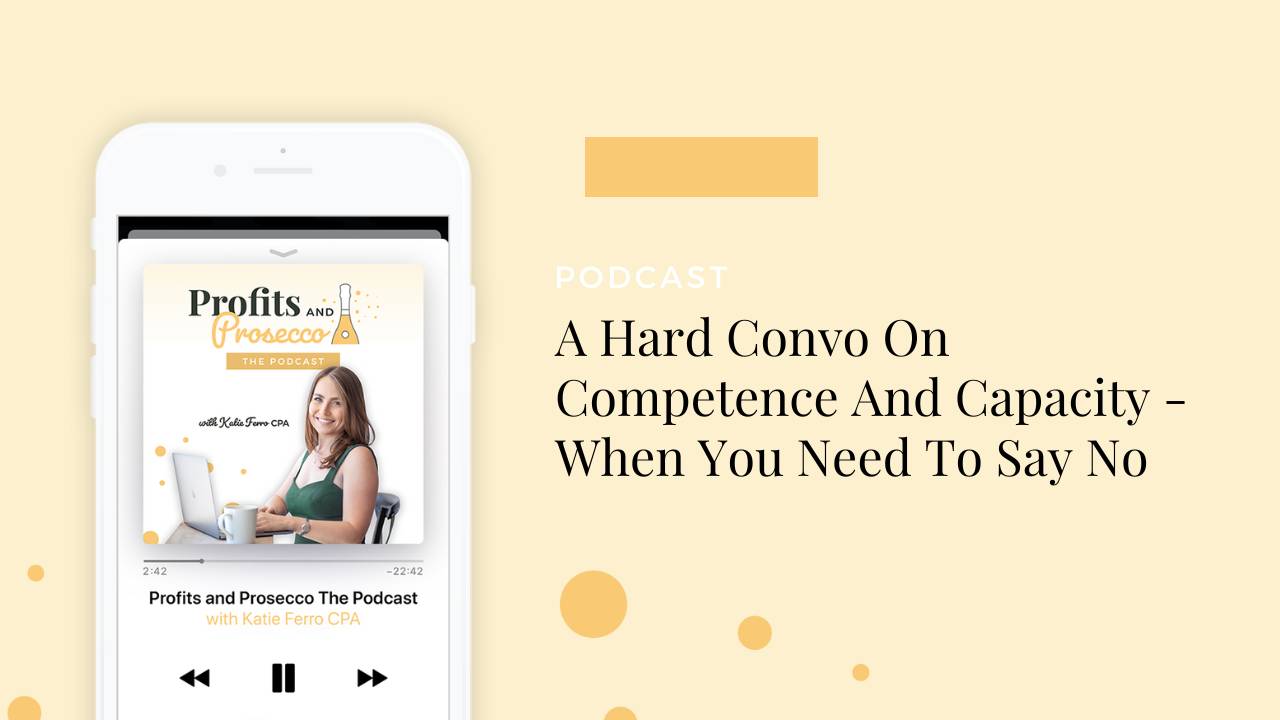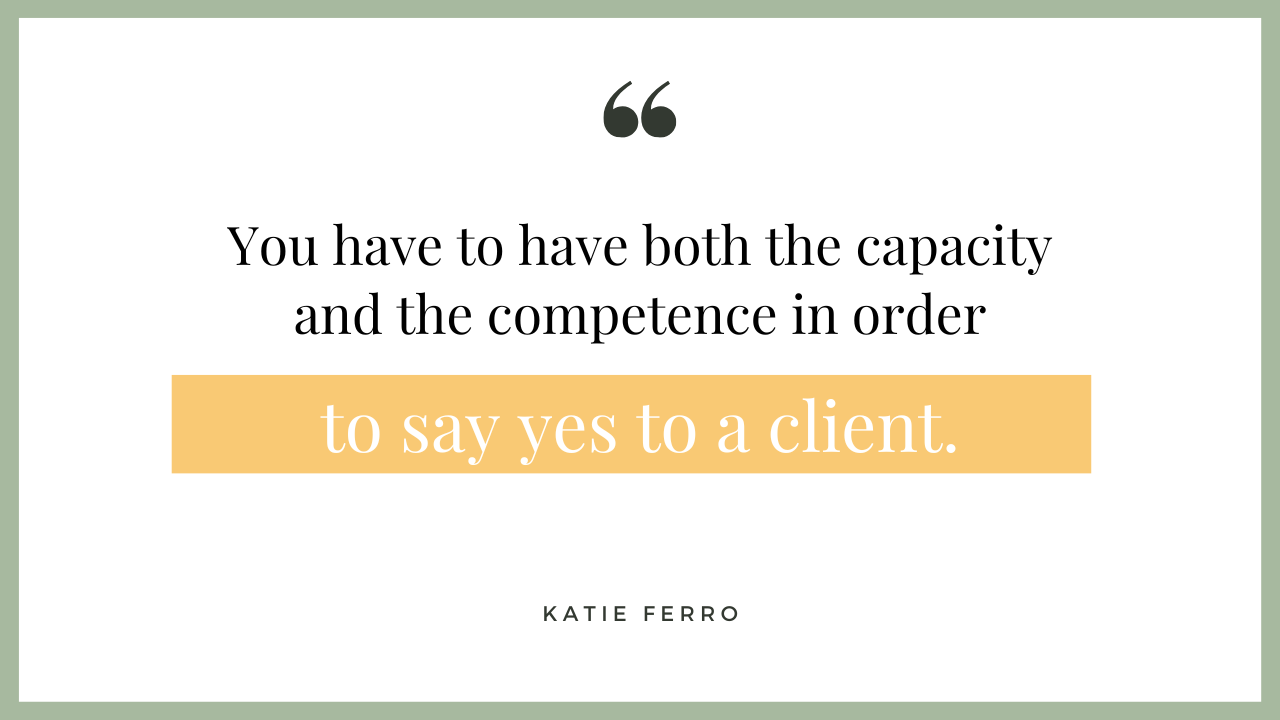A Hard Convo On Competence And Capacity - When You Need To Say No
Mar 13, 2023
Sometimes, in order to do ethical bookkeeping work, you have to turn down a client…even if you have the capability to tackle their books.
This is a tough topic to discuss, but it’s one of the most important facets of ethical bookkeeping out there, and I came face-to-face with the reason why this past week. Let’s talk about competence and capacity, and why you need both in order to ethically take on a client.
Competence and Capacity
My core message, which I continue to stand by, has two pieces to it: that bookkeeping can be simple and scalable, and that you need to commit to only taking on jobs you know you are capable of handling.
In order to do ethical bookkeeping work, we need to know what we're capable of doing, and we also need to say no to what we're not capable of doing for either one of two reasons: competence or capacity.
If you don't have the competence to take on a certain client or a certain gig, and you don't have oversight you can report to in case of questions, you should say no. And if you don't have the capacity to do the job well, you should also say no.
There's a difference between making space for a gig that stretches your time a bit, and being willing to honestly acknowledge that you won’t have time to do the job to the best of your ability.
In BABs, we cover two things that you need within your business in order to perform ethical bookkeeping services: a gut check on your competence and on your capacity. If one of the two are lacking, you have to say no. You have to have both the capacity and the competence in order to say yes to a client.
As many of you know, I used to be a CPA. I have a master's degree in tax. I have experience in the corporate setting for accounting, and I also have two tax seasons under my belt working at a reputable mid-sized CPA firm here in South Florida. All of those pieces together are the thing that make me competent and capable of doing the job of ethical bookkeeping, and they allow me to choose if I want to take on a more complex client or if I want to keep things simple.
For the most part, I choose to keep things simple, but I do deeply understand the complexities involved in bookkeeping and how what we do on the books affects tax, and that's really the biggest piece when you’re considering whether you have the competence to complete a complicated job through ethical bookkeeping.
We talk almost constantly in Life By The Books about where we draw the line on taxes and tax conversations, and I really think that the thing to keep in mind here is that it’s not passing the buck to tell your client that something is actually a question for their tax preparer. It’s honestly the right and ethical thing to do.
If you are not very well-versed in tax, it’s extremely important that you are passing the client on to the tax preparer—not in a dismissive way, or because you just don’t want to explain it, but because you need to be honest about your limits. And if you want to know the answer in case of future inquiries from other clients, bring yourself into the conversation as well!
What I want you to know is that if you don't have that real depth of knowledge surrounding tax and complex issues within bookkeeping, then to operate with integrity and do ethical bookkeeping work, you're going to have to say no to a lot of tempting offers.
However, that doesn't mean that there's not tons of opportunity out there. I have a bookkeeping business filled with at least twenty out of thirty clients that fit within what my program BABs will teach you, because even I know not to bite off more than I can chew.
For me, ethical bookkeeping is not a question of competence, but of capacity, which is why we have to consider both. Even if you have the competence to do a job well, you may not have the capacity. This is what I had to be honest about when I had a potential client approach me this past week with complicated books needing to be put in order.
I eventually told this client that I couldn’t go forward with them and have it be the right thing for them. It would have been good for me, because I could have made the money and figured it out, but I would have put the client at risk by doing so.
Why? Because I didn’t have the capacity. I have the competence, I understand his business and what's going on, but I don't have the dedicated headspace to devote to such a big job at this time. I don't have the infrastructure in place. I thought about changing my infrastructure to be able to accommodate this client, but ultimately, I don't have it now, and I'm not sure if I want it in the future.
So I said no. I said no to what could have been a good opportunity, which leads me to what I want to remind you of: when I say that bookkeeping skills can be honed and learned, I mean it, but in order to do so, you have to actually stay within the model of the simple scalable client, or you have to say no when tempting offers come up.
You will be tempted with complex clients. You absolutely will. And when those offers come up, you have to know the line between whether you can take that on or whether you can’t.
So yes, bookkeeping can be simple and scalable, but you have to allow it to be. You have to say no to the things that aren't okay, both for your clients and for you, so that you don't burn out or frazzle out when you take on something too complicated for you. You’ll end up waiting for the ball to drop at any moment, because you’re going to be exposed for the messes that you're making.
Prioritizing Integrity
There are two ways to do this and do this in integrity, and it's not all about coming into my program. I did it without my program, but I did it by going to school and getting a degree, and the degree wasn't enough.
That's the education, which is part of it, but you need the education and you need the application. So if you don't want to join a program, I respect it, but you should get the education, then you should get an accounting degree—or at least take a couple accounting classes—then you should go and get real-life experience, because that will get you much, much closer. But I still wasn't ready to take on clients the way that I do now. I had to couple my education with my on-the-job application, working under a good CPA firm with people that operated in integrity, that took their time to research things, that had a whole structure of partners and managers and staff and seniors where we collaborated on clients and I was free to ask questions, and I took it very seriously. From there, you probably have the foundation to understand what's happening at a high level.
Getting into the software is a matter of figuring out how to do what you know how to do, if that makes sense. And after that, then you can build a bookkeeping business, but expect to roll your sleeves up, working your way through YouTube and Google, and sometimes just flat-out figuring it out yourself, which is how I did it.
If you don't want to do that for whatever reason…maybe you have a full-time job, maybe you don't have time to go back to school, maybe you don't have the money to go back to school, maybe you have small children and you don't want to leave them, etcetera…then I think you can replace that type of thing with BABs, LIBBY, and continuous support until you get to the point where you feel competent, to where you've asked your questions because it's a safe place to do so, and you finally feel good taking on your clients.

Fill the Gaps
This conversation around ethical bookkeeping all started because last week, I got a phone call from a potential client who was referred to me by a CPA I know. He wanted me to potentially take a look at his books, and though it sounded like a lot when he filled out my intake form, it wasn't a hard no for me at the time. I wanted more information on whether it was simple or very complex.
One of the things that I always do with potential clients who already have books is to make sure I see the books and do a high-level peek around them. Typically what I'm looking at is their balance sheet, because that's where things go wrong.
So I asked for a peek at the balance sheet, and from just at a glance while running that balance sheet, I looked at the bank accounts and they had very high dollar amounts. And just based on the conversation that we had, I didn’t know that he really had that much in the bank, judging by how he was talking about cash flow. It’s not that he couldn't, but I always ask for bank statements to see if that matches up, and before I ask for bank statements, I go and look at the reconciliation history within the accounts. This one was in QuickBooks, and when I went to reconcile, it said “Get started with reconciling.”
That means it's never been reconciled. That doesn't necessarily mean that the balances are off, but it indicates that they very well could be, because it's never been checked. It’s rare that you're going to go through years of history and not have one mistake that you need to correct when reconciling.
If you don't know what I'm talking about with reconciling, by the way, you shouldn't be doing books. If you are not reconciling bank accounts, you do not belong in bookkeeping. You need to join BABs, or you need to start back at the basics. If you are not reconciling, you should not be working as a bookkeeper. Period.
That’s the harshest that I ever get, but I hate when bookkeepers miss really big, really basic things like that, because it's not okay. It taints the reputation of bookkeepers. That's why I care about getting the bookkeepers I’m mentoring to a standard that I can stand behind, and that’s why I constantly push the issue of ethical bookkeeping.

Ethical Bookkeeping
You can learn bookkeeping, but you have to prioritize ethical bookkeeping. That's the thing that I want to drive home. You can do it, but you have to take the time to actually master your craft. It's not a joke. This is not a fluffy industry; it’s a great industry, but it really matters. What you're doing really affects your clients. Ethical bookkeeping is the only acceptable form of bookkeeping.
I'm upset for that client I spoke to last week, because the bank balances didn’t end up matching up, and he definitely needs help getting it sorted out…and I could do it without sacrificing my commitment to ethical bookkeeping, if I had the capacity. I could take it on, and I could figure it out, but with all of the things that I have going on and the way that I want to live my life, I had to say no. To continue demonstrating ethical bookkeeping, I couldn’t take that client on in good conscience.
I knew this was an important conversation to have, because I got tempted to say yes to this client, but my gut was screaming at me all week. I was stressed just knowing that was in my inbox and thinking about how big of an issue it might be. And I know if I’m having that much trouble saying no to a client, it’s probably something I should speak to here. So just remember: capacity and competence. You can’t have one or the other for ethical bookkeeping; you need both to say yes to your clients.
EPISODE RESOURCES:
You can access the Tech Talk Vault here: https://www.katieferro.com/offers/7npMUvRU/checkout
Learn how to take your bookkeeping skills and turn them into a business that allows you to replace (or surpass) your corporate salary, be present for your life, and profoundly impact your clients without selling your life in the process by joining Life by the Books (LIBBY).
If you're looking for more tips for bookkeeping, insight on how to become a bookkeeper, and how to say hello to a more confident business model, enroll in Become A Bookkeeper (BABs).
To learn about the programs and get a peek behind the curtain, head to www.katieferro.com/6-secrets.
If you have enjoyed this post, head on over to Instagram, share your IG stories, and tag me: @orderlyaccountingbykatie
CONNECT WITH KATIE:
Website: https://www.katieferro.com/




